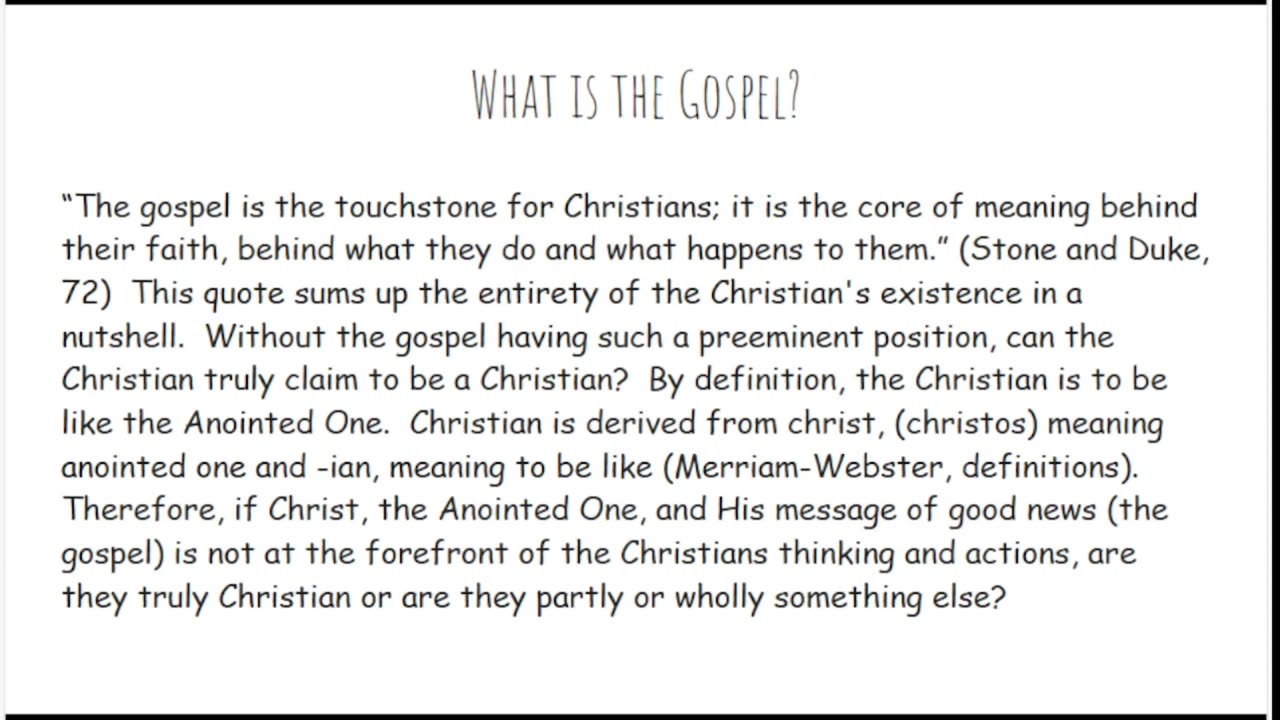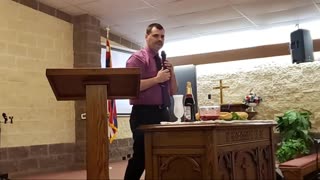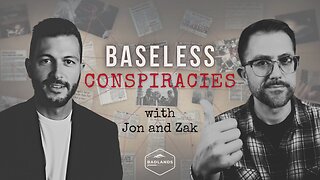Premium Only Content

What is the Gospel - Thinking Theologically part 3
What is the Gospel?
“The gospel is the touchstone for Christians; it is the core of meaning behind their faith, behind what they do and what happens to them.” (Stone and Duke, 72) This quote sums up the entirety of the Christian’s existence in a nutshell. Without the gospel having such a preeminent position, can the Christian truly claim to be a Christian? By definition, the Christian is to be like the Anointed One. Christian is derived from christ, (christos) meaning anointed one and -ian, meaning to be like (Merriam-Webster, definitions). Therefore, if Christ, the Anointed One, and His message of good news (the gospel) is not at the forefront of the Christians thinking and actions, are they truly Christian or are they partly or wholly something else?
Many have sought to argue both ways, and while dedicating immense resources and energy, few have been able to divorce the gospel (good news) of the life, death, and resurrection of Jesus of Nazareth with the teachings of the same man. Paul encourages and corrects Christians in Rome, Galatia, and Corinth concerning preaching any other gospel. (see 1 Cor. 15, Rom. 1, and Gal. 1)
C.S. Lewis coined the trilemma argument. In short, Jesus of Nazareth was either a lying conman, meaning he knew what he taught was false, but deceived his followers anyway. In which case, he, Jesus, should be soundly condemned and rejected. He was a lunatic, meaning he believed what he claimed to be true all the while the claims being, in reality, false. In this case, he, Jesus, should be pitied and his teachings rejected. Or Jesus of Nazareth is who he claimed to be and therefore, we (all of mankind) must wrestle with the reality of his teachings and order our lives to Him. (Mere Christianity)
The Gospel of Jesus Christ is hope for the sinner who follows Him, but a noose to those who reject His call to repentance and gift of Salvation. For there is no other why for men to be saved. (Acts 4)
Now let's turn our attention to how this reality and touchstone plays out in life with the Great Peasants’ War in 1524 in Germany.
On what basis should the Christian take up arms against those who are in government? This is the core of the Great Peasants’ War and the response by Martin Luther. Many may argue for or against Luther’s mediation, but few can deny, Luther’s position of condemnation of both sides for their evil ways. The nobles with their heavy hands and burdensome demands and the peasants with their violence and thievery. Is this any different than many conflicts waged in our own lives and world? Far from it. Whether it is the Arab Spring in Egypt, or the Ukrainian- Russian War, the illegal immigration on the US- Mexico border, or killing our children through abortion, the heart of man is deceitful in all his ways (Jer 17) for which no cure can be found outside Christ.
The Gospel is the hope of all mankind. Jesus instructs his disciple to be like him. (Mat. 28)
How did Christ handle the evils of the first century A.D.? Well, that is a deep subject which we cannot hope to cover in such a short essay. So, I will leave the reading with this. Don’t take my opinion for fact; read it for yourself.
““You have heard that it was said, ‘You shall love your neighbor and hate your enemy.’ But I say to you, love your enemies, bless those who curse you, do good to those who hate you, and pray for those who spitefully use you and persecute you, that you may be sons of your Father in heaven; for He makes His sun rise on the evil and on the good, and sends rain on the just and on the unjust.” (Mat. 5:43-45 NKJV)
90 & Out is a video commentary on the Christian Bible with new episodes uploaded periodically.
90 & Out is written, directed, and presented by Timothy Holt.
Timothy Holt believes the Christian Bible can be read easily but may take some effort to understand. With so many variations out there, how does one start their search for the truth? Hopefully, this channel will help you read and understand the Christian Bible more fully, as well as being entertained.
"The pursuit of knowledge is the beginning of wisdom" -ancient Jewish proverb
Thank you for watching this video and I hope it has impacted your life. Please subscribe for more video content. Comment, like, and share.
Or consider showing support with a monetary contribution using the PayPal link below.
https://www.paypal.com/ncp/payment/VD7ZP9QZB728U
Get Merch @ https://www.stickermule.com/ce4c064d751047c
Or https://holtscountertops.etsy.com
Contact us @ [email protected]
On other platforms:
90 and Out on Facebook
https://www.facebook.com/share/r/15kWKTjtj6/
On Rumble
https://rumble.com/c/c-562805
All copyrights and trademarks are owned and retained by their respective holders.
Stone, Howard W., and James O. Duke. How to Think Theologically. Minneapolis: Fortress Press, 1996.
-
 27:10
27:10
90 and Out
18 hours agoHow was the Passover Celebration in the First Century AD
51 -
 3:24:41
3:24:41
FreshandFit
13 hours agoShe Left A Great Situation. We Find Out Why! w/ Luke Belmar
267K33 -
 1:34:15
1:34:15
Badlands Media
16 hours agoBaseless Conspiracies Ep. 171: The Lady Bird Lake Murder Mystery
84.1K33 -
 2:47:32
2:47:32
TimcastIRL
10 hours agoTPUSA Halftime HITS NUMBER ONE | Timcast IRL #1445 w/ Scott Greer
319K153 -
 5:34:26
5:34:26
Drew Hernandez
1 day agoNETANYAHU ATTEMPTS DEFLECTION FROM EPSTEIN FILES AS CONGRESS VIEWS UNREDACTED FILES
51.3K39 -
 16:53
16:53
Stephen Gardner
10 hours agoWhat Newsom Tried to Hide From Trump & Homan Will Shock You
79.5K58 -
 2:01:56
2:01:56
TheSaltyCracker
10 hours agoWoke Bowl is Dead ReeEStream 02-09-26
119K226 -
 54:08
54:08
Amy Dangerfield
9 hours ago $8.19 earnedIyah May: Israel, Faith & Demonic Music Industry
61.1K18 -
 21:23
21:23
Jasmin Laine
11 hours agoTrump Leaves Canada SPEECHLESS—Demands IMMEDIATE Tariff Negotiations After SECRET China Deal
50.8K37 -
 56:25
56:25
Flyover Conservatives
14 hours agoTwo Halftime Shows, Two Americas: The Propaganda Playbook Revealed; Historic 2-Week Silver Plunge — Setting up $300 - $500 by Summer? - Dr. Kirk Elliott | FOC Show
83.6K5